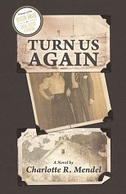Turn Us Again

Called to his dying father’s bedside, Gabriel Golden’s life is turned upside down after receiving his mother’s journal. The journal chronicles his mother’s life in post-war Britain, her genteel upbringing and her eventual marriage to Gabriel’s father, a complicated man raised in an aggressive, Jewish family, who drinks to escape financial worries. Gabriel is shocked as the novel reveals dark secrets about his parents’ relationship, shaking Gabriel’s preconceptions about his father — and himself.
Based on a true story and winner of the Atlantic Book Award for the Margaret and John Savage First Book category, the Beacon Award for Social Justice, and the H.R. Percy Novel Prize, Turn Us Again is a powerful exploration of the dynamics within family relationships, enticing the reader to embark on a journey towards a more complex understanding of the issue of abuse.
Based on a true story and winner of the Atlantic Book Award for the Margaret and John Savage First Book category, the Beacon Award for Social Justice, and the H.R. Percy Novel Prize, Turn Us Again is a powerful exploration of the dynamics within family relationships, enticing the reader to embark on a journey towards a more complex understanding of the issue of abuse.
Reviews
Published Reviews
"Fictional accounts of unhappy marriages can be placed on a dramatic continuum. On one end, we have Anna Karenina throwing herself in front of a train, Emma Bovary swallowing arsenic and April Wheeler in Revolutionary Road performing her own abortion. Somewhere in the middle of the spectrum may be Madelyn Golden, whose suffering is quiet but lengthy and unrelenting. The chapters depicting Madelyn’s life as a young woman in London in the late 1940s and early ’50s while she’s a hard-working nurse with an active social life are among the book’s most captivating.Mendel cleverly uses the manuscript and Sam’s marginalia (which often disputes Madelyn’s record of their life together) to reference the issue of truth in narrative construction."
--The Chronicle Herald, July 2014
“Turn Us Again is an extremely complex novel which delves into a number of themes including family violence, women yearning to re-enter the work force for economic independence, and coming to terms with one's family history. Mendel masterfully weaves the manuscript, outlining a pattern of family violence, into the father's modern day justifications for his actions. Turn Us Again is an exquisite work of literary fiction which will inevitably force readers to question their perspective of why and how abuse is replicated and passed down from generation to generation.”
--Halifax Media Co-op, September, 2013
Author Reviews
“Turn Us Again powerfully, painstakingly, and painfully explores a difficult theme, effectively shifting perspectives to show multiple sides of a shattered family history. Readers will find themselves pulled into the darker side of love, partnership and family, the part that usually comes after the movie ends. The writing here is well crafted, developing the complex, complete characters that drive the story heartward. It will stay with readers long after the last page is turned.”
—Chris Benjamin, author of Drive-by Saviours and Eco-Innovators
“At the heart of the novel is the quest to seek answers in the wake of violence and the daunting if not impossible challenge of forgiveness. Mendel does not give answers but the novel leaves this reader understanding once again the healing power of narrative in all our lives. A brave story indeed.”
—Sheree Fitch, poet and author of I Died on a Hot June Day
Read complete reviews by the The Chronicle Herald, Halifax Media Co-op and Goodreads.
"Fictional accounts of unhappy marriages can be placed on a dramatic continuum. On one end, we have Anna Karenina throwing herself in front of a train, Emma Bovary swallowing arsenic and April Wheeler in Revolutionary Road performing her own abortion. Somewhere in the middle of the spectrum may be Madelyn Golden, whose suffering is quiet but lengthy and unrelenting. The chapters depicting Madelyn’s life as a young woman in London in the late 1940s and early ’50s while she’s a hard-working nurse with an active social life are among the book’s most captivating.Mendel cleverly uses the manuscript and Sam’s marginalia (which often disputes Madelyn’s record of their life together) to reference the issue of truth in narrative construction."
--The Chronicle Herald, July 2014
“Turn Us Again is an extremely complex novel which delves into a number of themes including family violence, women yearning to re-enter the work force for economic independence, and coming to terms with one's family history. Mendel masterfully weaves the manuscript, outlining a pattern of family violence, into the father's modern day justifications for his actions. Turn Us Again is an exquisite work of literary fiction which will inevitably force readers to question their perspective of why and how abuse is replicated and passed down from generation to generation.”
--Halifax Media Co-op, September, 2013
Author Reviews
“Turn Us Again powerfully, painstakingly, and painfully explores a difficult theme, effectively shifting perspectives to show multiple sides of a shattered family history. Readers will find themselves pulled into the darker side of love, partnership and family, the part that usually comes after the movie ends. The writing here is well crafted, developing the complex, complete characters that drive the story heartward. It will stay with readers long after the last page is turned.”
—Chris Benjamin, author of Drive-by Saviours and Eco-Innovators
“At the heart of the novel is the quest to seek answers in the wake of violence and the daunting if not impossible challenge of forgiveness. Mendel does not give answers but the novel leaves this reader understanding once again the healing power of narrative in all our lives. A brave story indeed.”
—Sheree Fitch, poet and author of I Died on a Hot June Day
Read complete reviews by the The Chronicle Herald, Halifax Media Co-op and Goodreads.